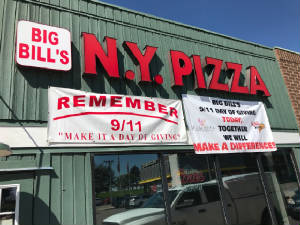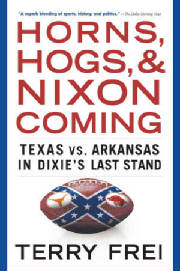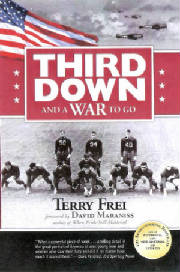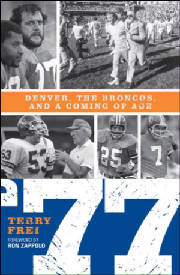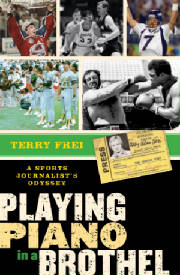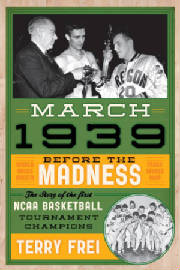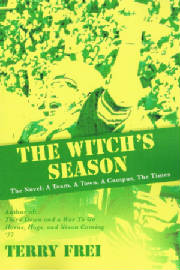We've
stayed in touch since, of course, but on Saturday, Frank -- who is 68 and recently has had some health issues -- and I caught
up with the recorder on in the wake of the maddening recurrence of mass shootings and the shameful lack of progress toward
implementing common-sense gun control legislation. I'm also not going to insert many clarifying details. I'll assume you're
aware of events, especially recent ones, that we discuss.
With another anniversary coming up, what thoughts go through your mind?
Frank DeAngelis: "Something that really hit home
a week ago Thursday was when they called me out to Denver East. I met with some kids and with the police officers they're
fortunately bringing back into the schools. Then the principal wanted me to address their faculty. As I'm standing there and
she introduces me, I look out at them. Even though it's 2023, it took me back to '99 when I had to address our staff. The
circumstances were different, of course, but I was looking into their eyes. It brought back a lot of memories. Being in counseling
for the past 24 years has helped me get through these tough times. It retraumatizes you each time another school shooting
occurs.
"This
past year, some of the parents who lost their kids have started reflecting on what their kids' lives would be 24 years later.
Projecting and envisioning. 'If my son or daughter still were here, I know this is what they would do because they'd love
working with kids, they'd be involved in the medical field ...' And more. Instead of mourning their deaths they're celebrating
what their lives would have been. It really helped me get through some tough times...And I look at the survivors, like Patrick
Ireland, who has three little kids, and you wonder what the lives would have been like for the 13."
It seems that every week or
sometimes every day, "it" happens again. Another mass shooting, whether in a school or otherwise. Does it jar you
every time?
FD: "It does. I
was really naive. I think back to that first week of April after Columbine happened, I said I just hoped the Beloved Thirteen
didn't die in vain. They continue to happen. It's hurtful, but I can't give up hope. When I saw the elementary school, when
I saw what happened at Uvalde, it took it back to 2012 and Sandy Hook. And seeing now what happened at the Covenant School
in Nashville, it does take you back again. I think our society as a whole is questioning it, because I think a lot of parents
feel, 'Well if we put our kids in private schools, it's not going to happen. But now you look at what happened at Covenant.
"I think we just have to say, 'Enough
is enough.' I just wish politically that both sides of the aisle can come across and say, 'What's the best for our kids?'
They're all of our kids. It doesn't matter, Democrats or Republicans. Enough is enough. I hope we don't get to the point where
we hear of another shooting we're saying, 'OK, how many this time?' We just can't accept this. I made a promise 24 years ago
that I'm not going to give up hope. I'm going to continue to fight for all of our kids."
Every time it happens, Columbine
is re-mentioned, particularly in citing the response protocol at Columbine, which at the time was secure the perimeter and
wait. Now, at least at places other than Uvalde, law enforcement enters as soon as possible and engages the shooters. What's
your reaction when you seem to hear 'Columbine' every time? Did it at least serve as the catalyst for modifying the protocol?
FD: "People
say, 'Frank, you've been speaking for 24 years but shootings continue to happen.' However, I look at how many have been stopped
because of different protocols. That doesn't show up in the media. Many things have been stopped. Look at Covenant just recently
where there was an officer that stopped the shooter immediately. When Columbine happened and many of the officers that you
and I know in Wheat Ridge and North Denver and the surrounding areas were responding and were standing on the street saying,
'I can't believe we're not going in. We were sworn to serve and protect and we have to wait for SWAT.' That was the protocol
then. Now officers are being trained to go in. When you see the events where they're not following that [revised] protocol,
it's hard. Also, every time we put something into place, the people trying to plan these events try to outdo what's in place.
At Sandy Hook, they had the doors locked. Everything was locked. Nobody anticipated the gunman shooting through the glass.
Now there are protective shields on the glass.
"We can't get complacent. I don't think there's one thing that's going to stop it. The first place people will
go to is gun control and that's one major piece of it. But I worry about what happened in Denver [at East]. I really believe
that School Resource Officers should be at schools. These resource officers are trusted adults for the kids. When we had them
at Columbine, they were great. They were part of our staff. They talked to our kids in classes, they were in the hall conversing
with students, they attended extracurricular activities, they were trusted adult figures. So I think that's a key piece.
"I hear schools and districts are thinking
of removing counselors and social workers; that scares me. I'm not saying every kid that has mental issues is going to commit
a shooting. But there are kids crying out for help. And the thing you and I both know has changed in the last 24 years is
the role social media is playing. After Columbine the only social media I can remember is MySpace. Now I can't imagine if
the social media that we have today was in place back in '99. One of the things I saw at the end of my career was a lot of
our kids were being raised by grandparents and even great-grandparents. I'm a loving grandfather, but the way I raised kids
20 years ago is different than how I would raise them now. It is almost like we need parenting classes for grandparents and
great-grandparents. When I go out and talk to people, I say it's not just one thing. I use the jigsaw puzzle analogy.
"But how an 18-year-old can buy an
automatic weapon; I struggle with that. We have to look at the gun laws, yes. We have to look at mental health issues. Social
media. Now when you start putting the pieces together, we have a chance."
We've talked about this a lot, but it bears
repeating. The guns the killers had at Columbine didn't include an assault rifle. They had a TEC-DC 9 semi-automatic handgun,
purchased illegally from someone introduced to them by a mutual friend; plus, a 9mm carbine, a sawed-off 12-gauge pump shotgun,
and a sawed-off double-barreled shotgun. The latter three were purchased by the prom date of one of the killers at the Tanner
Gun Show. She had just turned 18 and could buy the guns under the then-disgustingly loose (and since-tightened through a voter-passed
initiative) rules for sales by unlicensed dealers at shows. Under directives from the underage destined-to-be killers, she
showed her ID, paid cash and bought three guns. So, no assault rifles. What do you think now of the focus on trying to ban
AR-15 type guns -- or at least raise the minimum age for purchasers?
FD: "It's
all important. Look at when the girlfriend was at the Tanner Gun Show. She came out afterward stating that if the independent
gun dealer had done any questioning, she would have walked out of there. Now some of these kids are making these ghost guns,
which can't be traced. We just have to say, 'What's going on?' People can refer back to Second Amendment rights, well that
was back in the 1770s. We have to look at common-sense laws.
"Where I struggle, and it was a few years ago, the young (Columbine-obsessed)
woman came in from Florida. She was able to purchase a rifle six miles from Columbine. No wait period. That should not be
happening."
To me at least, it sounds as if you've hardened on your gun-control views in recent years.
FD: "I
have. I've seen some things. And lately, I had a politician tell me, 'You don't understand, we need these automatic weapons
with 30-round magazines to kill animals.' That doesn't make sense to me. For the people who say we're entitled to self-defense?
I agree, but why would you need a 30-round magazine to defend yourself? I think there has been some legislative action to
address issues, but we must continue to do everything we can to protect our children.
"I do have to give the kids at Parkland credit. After
what happened on Valentine's Day 2018, the kids stood up and said, 'Enough is enough. You adults tell us you're going to do
this, do this, but it's the same thing.' I encourage the students from Parkland to go to the poll to elect officials that
could make the kind of changes they're seeking. After Denver East and other places, we were yelling and screaming that it
had to stop. But the same thing is happening. We have the same discussions after every shooting. The sides need to come together
and say, 'What are we going to do?' It's got to stop."
Some legislators are advocating the arming of teachers in schools. Should we do
that?
FD: No. I'll use myself as an example. I could take
weapon training and be certified to carry; but I don't have the mindset to be able to kill someone. On April 20th, 1999, if
I would have been carrying a weapon, once I encountered the gunman and I realized he was one of students. I would have tried
to de-escalate the situation. As educators we feel we can help all kids. If he refused to listen and killed me the 25 girls
I was shepherding to safety would have died. When I talk to law enforcement officers, they talk about mindset, and I believe
people would be reluctant to go into public education if they knew they might have to shoot one of the students. I
would encourage anyone suggesting the arming of teachers to talk to law enforcement officers so they can give the reasons
why it's not a good idea. I do realize there are extenuating cirumstances, perhaps in rural communities where response
capability by officers is different than in urban and suburban areas.
So, you did the book and you make appearances
and speeches, mostly at law enforcement and education conferences around the country, but also at school assemblies and even
nursing homes. You remain active in your church. You occasionally have lunch with a writer buddy. What else are you doing
in retirement?
FD: "I'm involved with the National Association of Secondary School Principals. Back
in 2018, Greg Waples, the head of it, called and asked if I'd be interested in heading up what they called the Principal Recovery
Network. He said, 'It seems like you do it on your own whenever there's another shooting. You reach out to offer help.' Part
of the reason I do that is that I can remember afbout three days after Columbine, I got call from Bill Bond, the principal
at Heath High School in Paducah, Kentucky, where they had a school shooting in 1997. He said, 'You don't even know what you
need. But here's my number.' That was so valuable. It was all new. I don't care what kind of education you have, how many
degrees, you're never prepared for it. I said I hoped I never had to make that phone call, but I've had to make that phone
call 30 to 40 times in the past 24 years.
"Right now, we have 22 principals and superintendents from around the country where school shootings have occurred.
We reach out. And then last August the principals came to Columbine, and we had a meeting there. I had made that initial call
to all of the principals there. We created the Principals Recovery Guide. It's free to access. But it talks about dealing
with the aftermath. For example, what do you do when you go back in the building? What do you do at the first remembrance?
What do you do at graduation? How do you get the students involved? It's a useful guide because unfortunately we've been through
it. . . It's not because I'm Frank DeAngelis. Unfortunately, it's because of what you mentioned earlier. Still 24 years later,
Columbine is associated with school shootings, so when they hear it's the principal from Columbine calling, they usually
pick up to see what I can offer them.
"I truly know everybody does things for a certain reason. When I go out and talk, I say the
most important thing is you need to be able to take care of yourself. You've heard me talk about counseling. I'm still in
counseling. Right now, I'm struggling, but this is what keeps me going. I'm a person of faith. You know I grew up in North
Denver, went to Mount Carmel from kindergarten to 9th grade. But after the Columbine shootings, I was really questioning my
faith. Father Ken Leone, an old North Denver guy who had gone to Holy Family and Regis, called me up on the altar and said,
'Frank, you should have died that day, but God's got a plan.' He said, 'You're going to have to help rebuild that community
and you have to help others heal.' He quoted, 'In his Heart a man plans his course; but the Lord determines his steps.' That's
Proverbs 16.9.
"So,
every time this happens, I was thinking, 'Let's slow down,' but this is my calling. I have talked to clergy and people of
faith, and they've said, 'Frank, you've given.' Luckily, when I was laying in that hospital bed last week, I said, 'God, if
this is the way you want me to slow down, I'll slow down.' I just feel that as long as I can help people, I'll do it."
It's been 24
years now, though. We've all been through a lot since.
FD:
"Let me preface this by saying, I think if Columbine happened now, in this environment, I'm not sure I would have kept
my job. The morning after, I met with the school board president, Jon DeStefano. I said, 'I resign.' he said, 'No. You're
not going anywhere. You're the principal. You were the principal yesterday. You're the principal today. If you want to go
somewhere else, we will allow that to happen.' But today, in 2023, looking at a lot of these situations, it's different. I'm
real good friends with the principal at Parkland. They removed his entire administrative team within six months of the shootings.
They told him at one year he had a choice. He could either go to central administration or he didn't have a job. I had an
opportunity to stay. Originally, I was going to stay for three years until the Class of 2002 graduated, but then I thought
back to what the priest said about rebuilding the community. I felt like I didn't accomplish that in three years; so I stayed
until every kid who was in the elementary school that day graduated. Even though they hadn't been in the building, they were
affected by it. When they walked in as freshmen, they said, 'Mr. De, we remember helicopters flying, we remember makeshift
memorials.' I was there to support them.
"I have principals in the Principal Recovery Network today saying, 'Frank, I don't know how you did it. It's
affecting my life; it's affecting my health.' I say no, don't use me as an example. Every situation is different.' They have
to do what's best for them, their family, their health. That's what I say when I reach out. I remember getting calls from
some at Sandy Hook who asked how we could go back in our building. I didn't make that decision on my own. The community felt
that if we did not go back into Columbine, the two killers won. At Sandy Hook, they were saying, 'We just can't go back in
the building.' I understood. Each community is different. I said they could learn from things we did, but they had to do what
was best for their community. Those are the messages I have for those principals that are struggling."

Congresswoman
Diana DeGette, D-Colo., is at center. Frank DeAngelis is second from right.
(Photo by Terry Frei)
A few years ago, you invited me to attend when Congresswoman Diana DeGette was given
a tour and a demonstration of the lessons taught at the Frank DeAngelis Center for Community Safety at a shut-down elementary
school in the Denver area. Police from around the country were there, learning and practicing the response protocol maneuvers.
It was impressive -- and very loud. I assume that's still going.
FD: "It's still open and a dear friend of ours,
Steve Bell, your coach at Wheat Ridge, is one of those on the board of directors for that Jeffco DeAngelis Foundation and
doing a fantastic job. We've had over 10,000 people come through it. That's remarkable. We've had Navy Seals come in, too,
and what it does is train these officers and SWAT team members. It continues to improve and what we're hoping for now is to
continue getting grants."
What are you planning to do Thursday to mark the 24th anniversary? Columbine won't hold classes,
its annual tribute on April 20.
FD: "Every year, I have coffee with (long-time Columbine teacher) Kiki Leyba,
who is near and dear to me and was with me that morning when my secretary ran in and said there were shots reported. We both
ran out and encountered the gunmen. Every year, he and I and two of the other staff who were with me that day go over, and
we have coffee. Then I go to Columbine. I go to the HOPE Columbine Memorial Library by myself and I call all the families.
It's part of one of the promises I made when I went to visit them the weekend after Columbine. They said, 'Don't ever forget.'
I said, 'I will never forget your kids or loved ones.' So for the past 24 years, I've called them on April 20. Some pick up.
Some do not. The past few years, more family members have picked up. It's not about mourning, it's about talking about their
kids' lives before their tragic deaths.
"Last year, Danny Rohrbough's stepdad, Rich Petrone, said, 'Danny's birthday was March 2 and you know, he would
have been 41 years old.' I have those conversations and it's healing. I promised I would never forget. And then at 11:20,
I do a livestream. There are some alumni there. There's staff there. We invite all the family members of the Beloved 13.
The one thing I've learned over the years is everyone's in different places. People are very gracious and say, 'Frank, we
appreciate you inviting us, but we're not going to be there.' I understand that. Next year will be the 25-year remembrance.
We did these commemorations of remembrance at 1, 3, 5, 10, 15, 20 years. The last time we did it, in 2019 at the 20th, we
had fewer participation by the families who lost their loved ones. They said, 'Really, this is the last public thing we want
to do.' But I'll check with them. I still want to honor them."
Never Forget.




